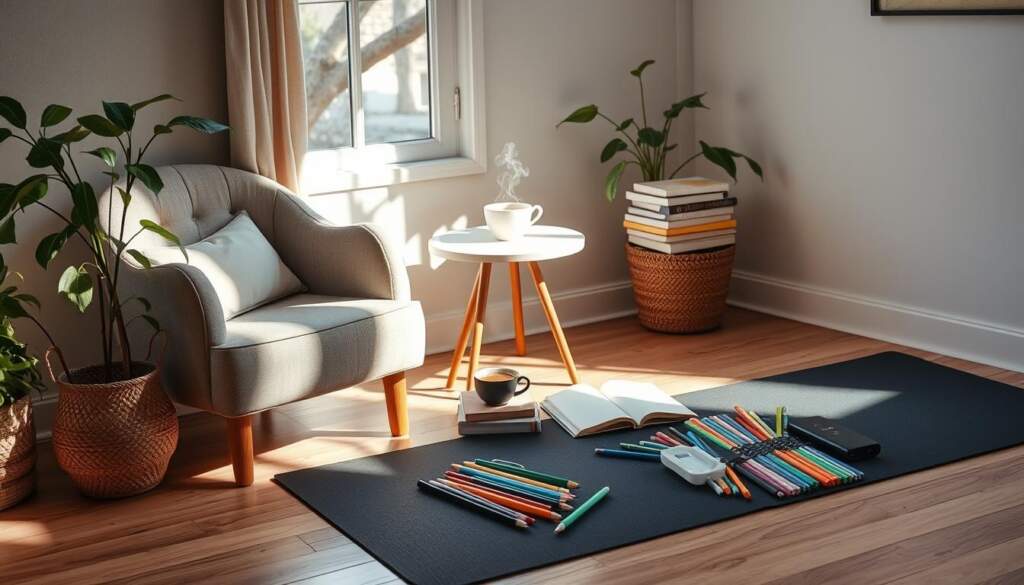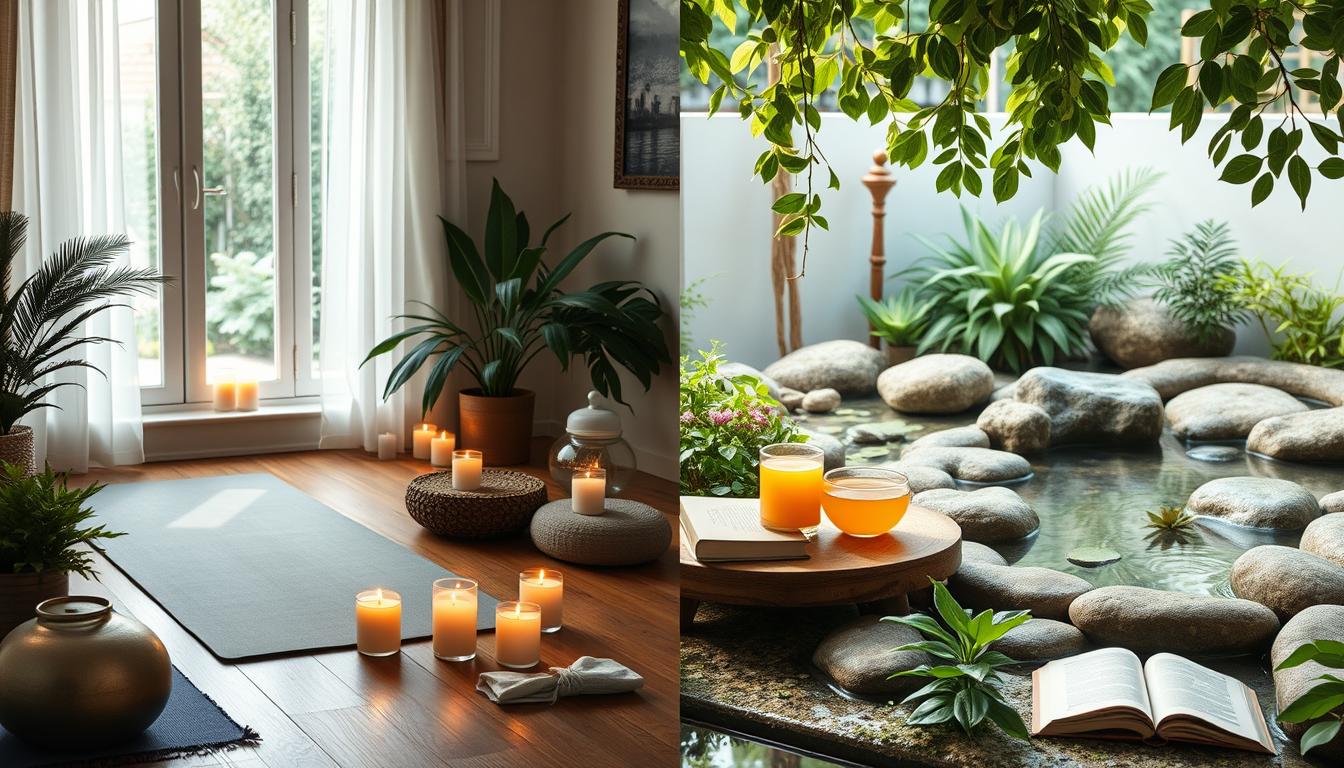In a world that never seems to slow down, incorporating self-care into our daily lives has become more than a luxury—it’s a necessity. With recent studies showing that rates of depression have tripled, underscoring the gravity of mental health support1, it’s clear that individuals across the globe are facing an unprecedented need to prioritize well-being and recovery from setbacks. Embracing a comprehensive self-care routine can not only tackle the challenges head-on but also contribute substantially to one’s happiness and overall well-being balance2.
Achieving this balance requires us to adapt to changes and build relationships that support both our physical and mental health. Engaging in physical activities is not only beneficial for the body but also releases endorphins that significantly improve psychological health1. Moreover, setting boundaries is integral to managing stress and forging healthy relationships, acting as both a protective and nurturing force in our lives1.
With the acknowledgment that it may take on average 66 days to establish new, constructive habits2, it’s crucial to approach incorporating self-care as a gradual, achievable process, tailored to individual needs and lifestyles. Whether it’s through refined diets, adequate sleep, mindfulness practices, or even environmental hygiene, each act of self-care interweaves to create a tapestry of mental health support and resilience3.
Key Takeaways
- Self-care is critical for combatting the significant rise in depression and anxiety1.
- Consistency in self-care routines is key to reaping long-term mental health benefits2.
- Physical activity and relaxation techniques are foundational elements of self-care13.
- Building strong support networks and personal boundaries are essential for emotional well-being3.
- Adaptable self-care practices can enhance self-confidence and productivity2.
- Practicing gratitude and mindfulness activities contribute to a refreshed mindset3.
Understanding Self-Care and Its Growing Relevance
The concept of self-care has significantly evolved beyond simple daily routines to encompass a comprehensive approach that fosters emotional health and combats stress and burnout. As we delve deeper into the nuances of effective self-care practices, the emerging statistical data sheds light on its pivotal role in enhancing life quality. A 2020 survey reveals that 7 in 10 Americans recognize the essential nature of self-care4, highlighting its widespread acknowledgment and incorporation into modern lifestyle.
Adopting a holistic well-being approach, which includes physical, mental, and emotional wellness strategies, is not just about personal indulgence but a necessary facet of modern living. For instance, regular physical activities not only improve cardiovascular health but are also positively correlated with reduced symptoms of depression and anxiety5. Moreover, self-care relevance in mental health can significantly lower job dissatisfaction and stress, particularly notable among healthcare professionals where yoga and mind-body meditation have proven benefits4.
Self-care is not a one-size-fits-all remedy but rather a personalized and evolving self-care practice. Engaging in self-care enhances self-confidence by 64% and boosts productivity by 67%, demonstrating its direct benefits on both personal and professional fronts5. Furthermore, incorporating structured health checks within self-care routines has been linked with improved long-term health outcomes, such as lower blood pressure and early detection of potential health issues5.
Ultimately, the power of self-care lies in its capacity to sustain not only the physical and mental dimensions but also the emotional and spiritual well-being of an individual. By prioritizing these practices, especially during challenging times, individuals are more likely to maintain resilience and a positive outlook on life. To explore more about integrating effective self-care habits that resonate with your lifestyle, consider subscribing to insightful newsletters that offer regular updates and tips.
Evaluating the Mental and Physical Health Benefits of Self-Care
Self-care is increasingly recognized for its pivotal role in enhancing quality of life and improving health. Recognizing the profound mental health support it provides, let’s delve into the scientific backing and real-world impacts of self-care routines.
Clinical Evidence Supporting Self-Care for Wellness
Recent clinical evidence has emphasized the benefits of integrating self-care into daily routines. It highlights wellness optimization, with SAMHSA outlining eight crucial wellness dimensions: emotional, spiritual, intellectual, physical, environmental, financial, occupational, and social6. The World Health Organization (WHO) also supports the notion, stating that self-care fosters health, prevents diseases, and assists in managing illnesses7.
Impact of Self-Care on Stress, Anxiety, and Depression
Studies reveal a steep incline in depression rates during the COVID-19 pandemic, underscoring the importance of self-care in reducing anxiety and managing stress6. Regular physical activities, a component of self-care, have been proven beneficial for mitigating depression and anxiety symptoms6. Furthermore, two types of self-care found in a Vagaro Survey—physical activity and mindfulness—show a marked reduction in stress levels, offering much-needed mental health support6.
Self-Care and Its Role in Preventing Burnout
Burnout is a direct result of chronic stress, often mitigated through effective self-care habits. Crafting a personalized self-care routine can serve as a preventive method, helping individuals avoid the overwhelm that leads to burnout7.
Tangible Health Improvements from Consistent Self-Care Practices
Implementing a consistent self-care routine has proven to yield tangible health improvements: enhanced self-confidence, increased productivity, and elevated happiness are notable benefits expressed by Americans in national surveys6. Regular sleep—a crucial self-care element—has connections to increased longevity, echoing the need for seven to eight hours of quality sleep per night to foster optimal health67.
Personal Fulfillment: Self-Care as a Unit of Measurement for Satisfaction
When viewing self-care measurement similarly to how we view nutritional intake, each strategy contributes not just to personal fulfillment, but also to a significant life satisfaction boost. Adopting such a perspective encourages ongoing involvement in varied self-care habits, fostering an environment where personal growth is not just possible, but also measurable.
The statistical evidence strongly supports this approach. Engaging in routine self-care activities has been empirically linked to reductions in mental health problems and improvements in overall well-being. For instance, consistent self-care habits are proven to reduce the occurrences of anxiety and depression8, while also helping to manage stress and enhance concentration8. Moreover, these practices are linked to lowering the risk of major health issues such as heart disease and cancer8.
On a daily level, regular self-care not only boosts energy levels and strengthens the immune system8, but also increases productivity, sharpening concentration and enhancing problem-solving abilities8. It’s evident that the efforts put into self-care mirror the care we might put into a well-balanced diet, with both contributing dramatically to our overall life quality.
| Self-Care Habit | Benefits |
|---|---|
| Regular exercise | Improves physical health, enhances energy levels8 |
| Adequate sleep | Boosts mental clarity, reduces burnout risk8 |
| Nutritious diet | Bolsters immune system, decreases disease risk8 |


Allocating time for self-care can be considered equally pivotal as the time spent on professional and social obligations. It cultivates a resilience that permeates all aspects of life, underscoring that nurturing oneself is as crucial as any other life duty. Indeed, by treating self-care as a fundamental need, we pave the way for a more balanced, fulfilled existence.
The Importance of Self-Care and How to Incorporate It into Your Routine
Self-care is a dynamic and essential aspect of achieving and maintaining optimal health and wellness. By understanding the multifaceted nature of self-care, individuals can create routines that not only address physical health but also enrich mental and emotional well-being9.


Initiating a successful self-care routine involves integrating self-care strategies that cater to personal preferences and lifestyle needs. This approach ensures that self-care becomes a sustainable and enjoyable part of daily life9.
Developing a Self-Care Routine That Works for You
Developing a self-care routine starts with identifying activities that support your physical, emotional, and mental health. Whether it’s a morning jog, reading a book, or meditating, it’s crucial to engage in wellness activities that you look forward to9. Emphasizing self-care integration into your daily life allows for a balanced routine that maintains your energy and motivation9.
Setting S.M.A.R.T Goals for Self-Care
To make self-care attainable, setting S.M.A.R.T goals can be incredibly effective. These goals are Specific, Measurable, Achievable, Relevant, and Time-bound, providing a clear roadmap to enhancing your well-being. For instance, committing to a 30-minute walk five days a week is a measurable and achievable goal that significantly contributes to physical and mental health9.
Small Steps to Self-Care: Simple Acts of Wellness
Starting with small, manageable steps can lead to substantial improvements in your overall health. Simple acts of wellness, such as staying hydrated, getting enough sleep, and taking short breaks during work, play crucial roles in self-care integration10. Regular engagement in these small acts can boost mood, reduce stress, and enhance mental resilience, making a significant difference in your daily life10.
Creating routines that incorporate different aspects of self-care, such as emotional and social activities, helps maintain a well-rounded approach. Engaging with friends, practicing mindfulness, and learning new skills are just as important as physical wellness activities in sustaining a healthy self-care regimen10.
Ultimately, the key to successful self-care is consistency and enjoyment. By integrating self-care strategies that fit your lifestyle and personal preferences, you develop resilience against life’s challenges and enhance your overall quality of life9. Whether through goal-setting or embracing simple daily activities, self-care fosters a nourishing environment for growth and happiness.
Practical Tips for Integrating Self-Care into Your Daily Life
Incorporating daily self-care into our routines isn’t just beneficial; it’s necessary for maintaining physical wellness and mental rejuvenation. Here are practical ways to embrace these practices every day.
Incorporating Movement and Physical Activity
Engaging in just 10-20 minutes of physical activity daily can dramatically enhance both your physical and mental well-being11. Options like yoga, strength training, or simple brisk walking combine to improve mood and reduce stress12. Starting with small, manageable sessions can help integrate exercise into your balanced lifestyle, ensuring it becomes a non-negotiable part of your day.
Embracing a Balanced Diet for Enhanced Well-being
Nutrition plays a crucial role in our overall health and ability to handle stress. Incorporating a variety of nutrients in your meals can uplift your mood and fortify your body’s defenses. Regular hydration and mindful eating practices contribute significantly to daily self-care, proving that what we eat directly impacts our physical wellness and mental rejuvenation.
Rejuvenating Through Adequate Sleep and Relaxation
A cornerstone of daily self-care, ensuring enough sleep each night allows for mental and physical recovery. Techniques such as mindfulness and deep breathing exercises before bedtime can promote better sleep quality and aid in reducing nighttime anxiety12. Moreover, setting aside time for relaxation, like reading or taking a relaxing bath, supports overall well-being and prepares you for a productive day ahead.
Achieving Work-Life Balance Through Self-Care Boundaries
Establishing firm work-life boundaries is essential for sustaining a balanced lifestyle. Simple acts like turning off work emails after hours and engaging in social or leisure activities can boost your mood and enhance your relationships11. Effective self-care also involves building a support network and practicing open communication to maintain mental health and foster personal connections12.
Practicing these tips can transform your approach to daily self-care, leading to significant improvements in your quality of life. Remember, integrating self-care into your daily routine doesn’t have to be overwhelming—it can be as simple as choosing activities that you enjoy and that contribute to your physical wellness and mental rejuvenation.
Conclusion
Embracing self-care is a journey that fortifies our resilience and refines our wellness journey. By consistently weaving self-care practices into our routines, we lay the groundwork for a healthy lifestyle that sustains us through life’s peaks and valleys. It’s the very fabric of the long-term success that hinges on our dedication to maintaining these practices daily, from achieving the recommended 7-8 hours of sleep for rejuvenation13 to integrating the suggested 30 minutes of daily exercise or even striving for those 10,000 steps to keep our physical health at its best1314.
The commitment we bring to our self-care routine—the mindfulness practices that reduce stress, the nutritious meals we prepare in advance, the hydration essential for our bodies’ functions—all contribute to significant positive changes in our mental and physical well-being1314. It’s not a luxury, but a necessity, to forge connections with nature, set aside time for activities that nourish the soul, and to be unafraid to set boundaries that protect our self-care commitments13.
Each dimension of self-care, from physical exercise to the quality of our social connections, is an integral component of a well-rounded and satisfying existence1314. We emerge more engaged, energetically equipped to meet the demands of an ever-evolving modern lifestyle, and, most importantly, attuned to the needs of our body and mind. Let us all move forward with a resolute mindset, recognizing that self-care is not selfish; it’s a vital framework for a happier, healthier, and more fulfilling life13.
FAQ
What does incorporating self-care into my routine entail?
Why has self-care become increasingly relevant today?
What clinical evidence supports the health benefits of self-care?
How can I measure the effectiveness of my self-care habits?
What are some steps to developing a self-care routine that works for me?
How can I incorporate movement and physical activity into my daily self-care?
Why is a balanced diet important for self-care, and how can I achieve it?
What role does sleep play in self-care, and how can I improve my sleep patterns?
How can setting boundaries help me achieve a work-life balance?
Source Links
- How to Establish a Self-Care Routine That Actually Sticks (5 min read) – https://stellishealth.com/how-to-establish-a-self-care-routine-that-actually-sticks/
- How To Start a Self-Care Routine (and Stick To It) – https://health.clevelandclinic.org/how-to-start-a-self-care-routine
- Thrive tip: How to Incorporate Self-Care for Your Well-Being – https://hr.wustl.edu/how-to-incorporate-self-care-for-your-well-being/
- What is self care? Examples and more – https://www.medicalnewstoday.com/articles/self-care-examples
- The Importance of Self-Care Routines – Ezra – https://ezra.com/blog/the-importance-of-self-care-routines
- How and Why to Practice Self-care – https://www.mentalhealthfirstaid.org/2022/03/how-and-why-to-practice-self-care/
- 5 Types of Self-Care for Every Area of Your Life – https://www.verywellmind.com/self-care-strategies-overall-stress-reduction-3144729
- What is Self-Care and Why is it Important For You? – https://www.snhu.edu/about-us/newsroom/health/what-is-self-care
- How to Start a Self-Care Routine You’ll Follow – https://www.everydayhealth.com/self-care/start-a-self-care-routine/
- The importance of self-care for maintaining mental health | Marquette Today – https://today.marquette.edu/2024/08/the-importance-of-self-care-for-maintaining-mental-health/
- 10 Tips for Integrating Self-Care Into Your Daily Routine – NeurAbilities Healthcare – https://neurabilities.com/10-tips-for-integrating-self-care-into-your-daily-routine/
- A Complete Guide To Integrating Self-Care Into Your Daily Routine – https://www.abhasa.in/articles/guide-integrating-self-care-into-your-daily-routine/
- The Importance of Self-Care: Prioritizing Your Health and Well-Being – https://www.linkedin.com/pulse/importance-self-care-prioritizing-your-health-well-being-biopatrika
- My Personal Reflections on Self-Care: The Importance of Taking Care of Yourself – https://www.linkedin.com/pulse/my-personal-reflections-self-care-importance-taking-care-marcela-ugaz





